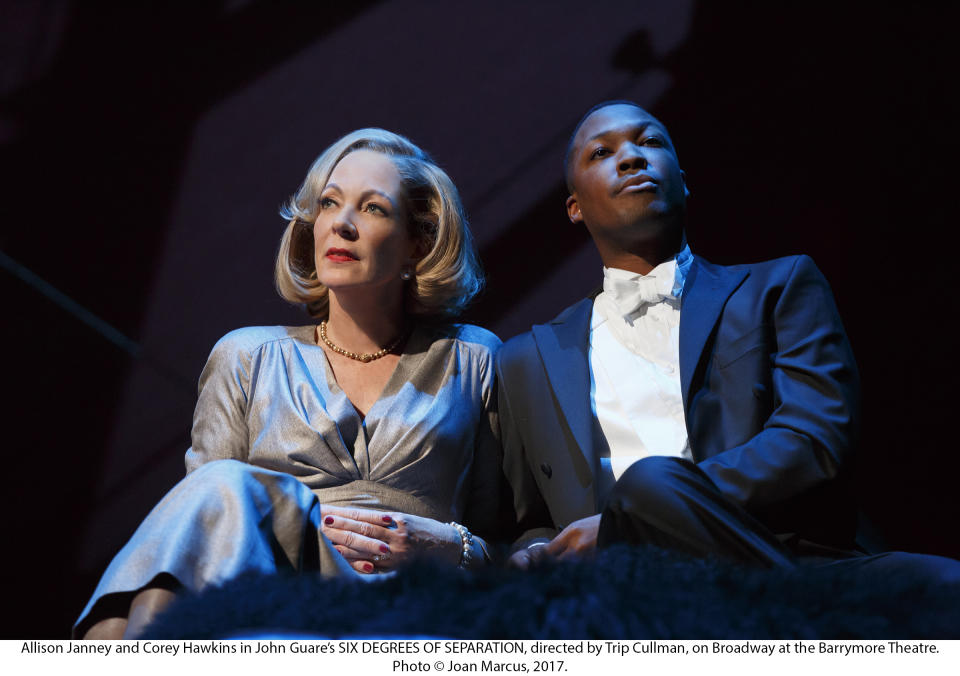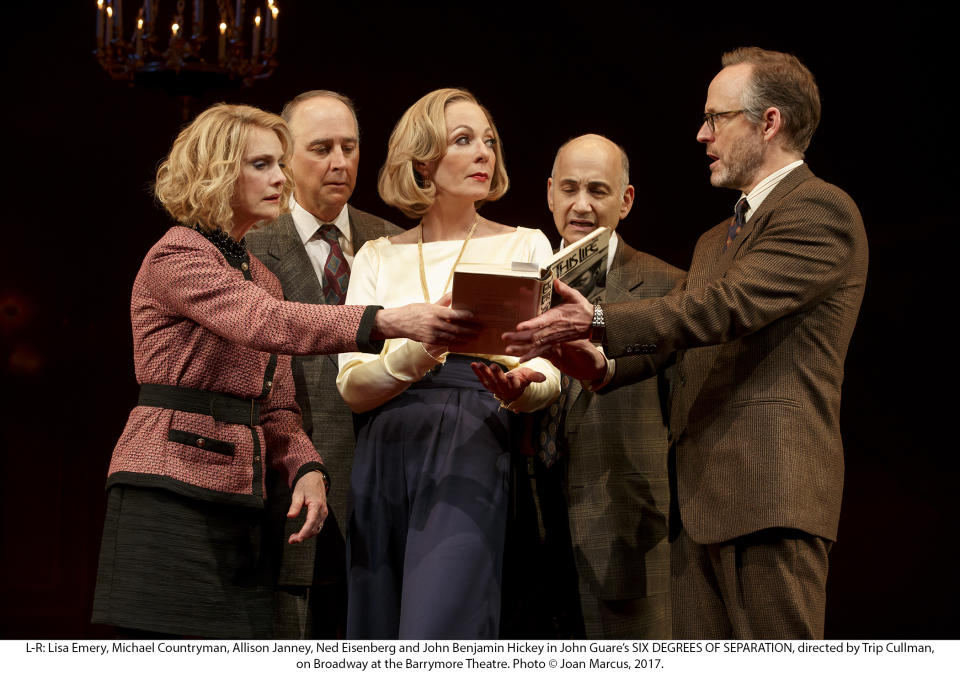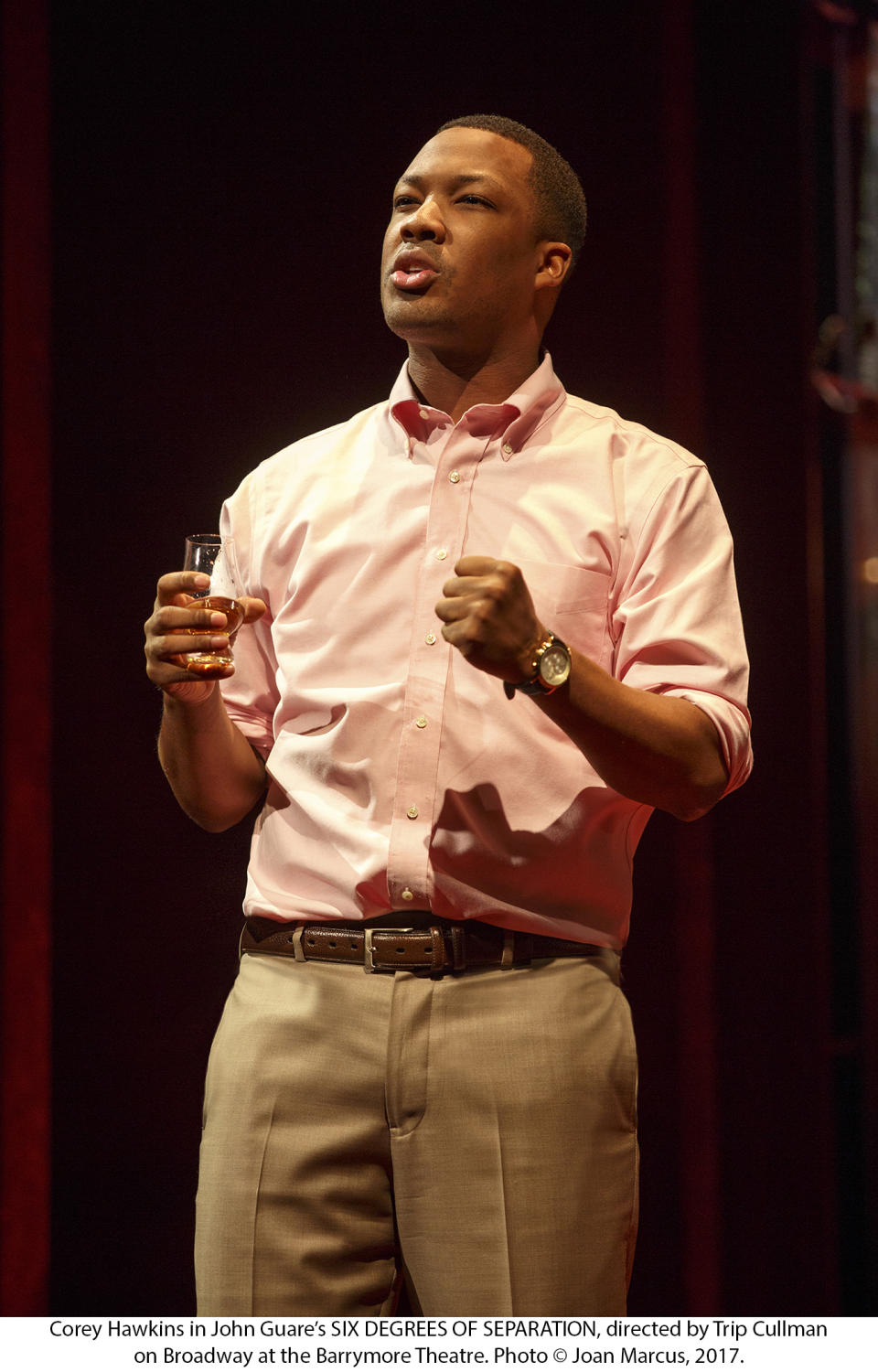Six Degrees of Separation Opens on Broadway

You remember Six Degrees of Separation maybe from its 1990 Broadway debut and definitely from the 1993 film. You remember the concept behind the title, which predates John Guare’s play but was arguably made famous by it: That everyone is connected to everyone else by at most six points of connection. (I live in the same apartment building as Andy Cohen, the TV host. One of Cohen’s closest friends is John Benjamin Hickey, who stars in the revival. I am three degrees from Six Degrees.) You remember that it’s funny, and sort of profound, a skewering of blinkered wealthy white liberal piety, a consideration of the stories we tell about ourselves and others. You remember the two-sided Kandinsky.
What becomes unexpectedly clear at the slick, stylish, and surprisingly dated revival that opened tonight at the Ethel Barrymore in its first Broadway revival - starring Hickey as Upper East Side art dealer Flan Kittredge and Allison Janney as his wife, Ouisa - is that Six Degrees turns out to be, with a bit of interpretation, a sort of proto Get Out.

This is not only because Hickey, on stage in beard and glasses and comfortable middle age, bears an unmistakable resemblance to Bradley Whitford in that social-commentary-comedy-horror film. It’s that so much resonates between the two works, with Guare’s genteel Fifth Avenue aerie a more polite version of the white suburb in the movie to come.
In both, the milieu is seemingly earnest, seemingly enlightened, and filled with objets. In both, a charming, handsome, smart, young black interloper appears and changes things. And in both, that younger black man is invested by those older white people with a certain magical, transformative virility, one the white people envy. In both, his blackness is a thing to be consumed. In Six Degrees, the results are surprising, confounding, and tragic. In Get Out - not to spoil the twist - let’s just say they’re a lot worse but also a lot more Gothic. But they’re both about people and things who, like that Kandinsky, might be one thing or something else.
Allison Janney is excellent in the part, a commanding, haughty WASP matron who can’t shake her sense of decency.
You know the Six Degrees story: Paul bursts into the Kittredges’ apartment, claiming to be a college friend of their kids’ who’s just been violently mugged in Central Park and needs to a place to get patched up. He charms them, and their guest, a wealthy South African who might be persuaded to invest in a deal Flan is trying to put together. Paul cooks dinner, tells them he’s Sidney Poitier’s son, and is invited to stay over. (Wonderfully and ridiculously, he dangles the possibility of appearances in a Poitier-directed movie of Cats.)

To cap off his night, he hires a hustler; the two are discovered in flagrante delicto and evicted; and then the Kittredges, with the help of some similarly scammed friends, try to figure out what has happened. Their kids are enlisted, the fraud is unraveled - a prep-school friend had a photographic memory and a big mouth - and Ouisa, especially, is transformed.
She isn't angered by Paul's con but rather moved by this kid who wanted so much to be a part of her world. Their connection was real, even if nothing else about him was. “It was an experience,” she famously says. “I will not turn it into an anecdote.”
Janney is excellent in the part, a commanding, haughty WASP matron who can’t shake her sense of decency. Hickey’s character lacks that shading, so his strong performance is less memorable. Corey Hawkins makes a fine Paul, effortlessly selling all his personas. And almost three decades after its debut, the play’s commentary on race and class remains incisive.
But other parts have aged less well. What’s surprising, and very dated, is how ickily Six Degrees views homosexuality, beginning with the utter revulsion at Paul’s tryst. “You went out after we went to sleep and picked up this thing?” Ouisa screams at him, which I don’t think is what she’d say to Poitier’s straight son and a girl he took back from a bar.
And it continues through the sleuthing, when the kids immediately realize the person who told their life stories: Trent Conway, a gay kid from prep school who is presented as suspect for no reason except because he’s gay. Even worse, Chris Perfetti plays Trent - who it turns out picked up Paul in Cambridge, brought him to his MIT dorm, and spilled his former classmates’ beans in exchange for sex - as a scary, gay-panicky viper.
Beyond that, while Ouisa and Flan and their story and worries are presented as naturalistic and authentic, all of the scenes with the kids are 80s camp. They’re brief comic interludes of adolescents in L.L. Bean and Polo, hilariously exploding at their parents with entitled Koch-era angst.
Which points to the limits of this revival, as fun as it is. Six Degrees of Separation, as seen here, is a great play with great performances but very much a creature of its time. The conversation has moved on. The play has turned into an anecdote.
You Might Also Like

